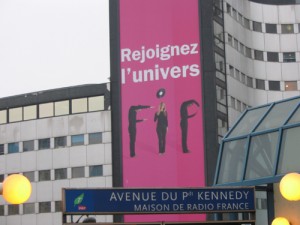
In the Food & Drink section of this site I note that traveling in France turns everyone into a food critic. In the same way, an American election, especially this one, turns everyone into a pundit. Including me.
I used to be quite reserved in my punditry, but on U.S. Election Day 2008 I got a phone call from Hervé Guillemot, the host of a radio program on Radio France Internationale, inviting me to be a guest on his show the following day to discuss the U.S. election results. The show is called “Les visiteurs du jour.” I suppose that I was invited to represent the (French-speaking American) man on the street (of Paris), otherwise there was no reason to ask for my opinion on the subject. The host had gotten my name from a French journalist friend of mine.
During my ten-minute appearance in the studio at Maison de Radio-France (photo) I had nothing original or remarkable to say, but I managed to give clear (I believe) answers to every question without hesitation, which is what the exercise of being on the radio is all about. I already knew that from several radio experiences in the U.S. And now I knew that being a pundit requires no more than opening one’s mouth and spouting conventional wisdom mixed in with some personal experience and a few well-placed so-called facts, and to do so until someone interrupts you. It’s as simple as that. Within a minute you actually start to believe that you have something to say. You think: If people are listening, if the host keeps asking me questions, and if no one is correcting my French then I must indeed have something to say. And so you speak until finally the host says, “We’ll be back right after the news,” shakes your hand, and thanks you for coming.
With my new-found confidence in the strength of my opinions I went home and wrote a two-line Letter to the Editor and e-mailed it to The New York Times. On Friday, two days later, I learned that it had been published in that morning’s paper. I found out from my mother, who sent me an e-mail telling me that that a friend of hers had seen my name in the Times. My mother further noted that I’m the first person in the family to have a Letter to the Editor in the NY Times since her brother, my Uncle Donald, was published on that page in 1945. (No one else has tried, as far as we know.)
Since then I’ve heard from a half-dozen others who saw my little letter. And happy as I am to have added two lines to my CV in a single week—
1. Spouted wisdom on French radio,
2. Opined in The NY Times
—I’m slightly dismayed by the thought that when I write two lines in two minutes I hear from people I haven’t heard from in years whereas I write thousands of lines over countless hours and dead silence ensues.
The thing about punditry, I’ve found, is that the moment someone pays attention to your words you start to think that you have something to say, not just about subjects you’re supposed to know about, such as where to enjoy a good bottle of organic Côte du Rhône, but about whatever the day’s headlines may be, and then some. But as a newly minted know-it-all there are two ways this punditry thing can go:
1. you can turn out to be like the Straw Man after the Wizard tells him that the only difference between him and recognizably intelligent people is a diploma (i.e. a microphone or op-ed column) and so start spouting the Pythagorean Theorem,
2. or you can turn out to be like Joe the Plumber.
As a writer involved in a new online travel magazine I don’t think I’ll take my chances on full-time punditry right now.
Come to think of it, it’s rather consoling to know that I can write thousands of lines without hearing from anyone. After all, I imagine that life for the pundit gets very lonely when they take the microphone or op-ed column away. For the writer it’s just the opposite.

